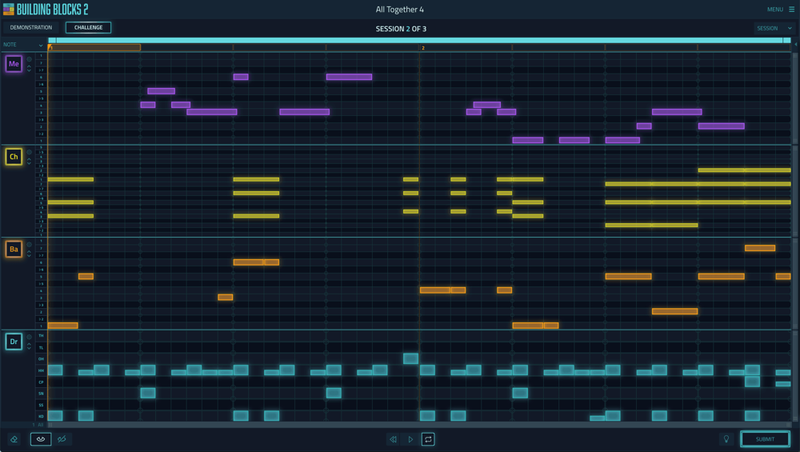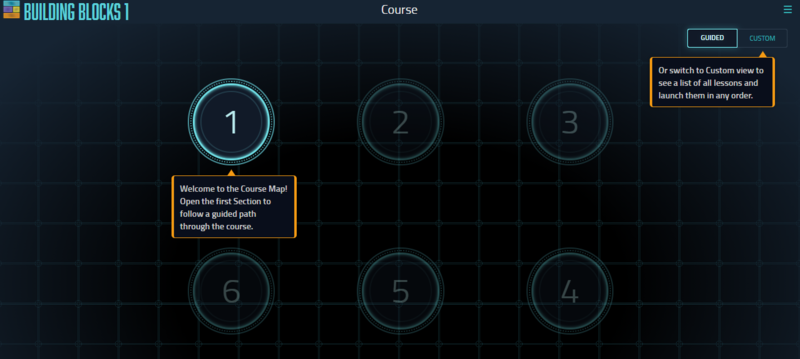Buy Building Blocks 1 & 2 Bundle, get a free gift with purchase:
Music Theory & Composition Course for DAW-Based Music Makers
Drum Patterns, Basslines, Chord Progressions, and Melodies: Learn how to create these four essential elements of music in an engaging DAW environment with Building Blocks.
Building Blocks is an online music theory and composition course tailored to the needs of DAW-based music makers. Starting from the very beginning, you'll embark on a video game-style interactive journey in an online DAW. And along the way, you'll build real-life music-making skills with an intuitive step-by-step process until you're making your own original beats from scratch.
Building Blocks 1 & 2
Save by buying Building Blocks 1 & 2 together, and learn how to create all four essential elements of music composition: Drum Patterns, Basslines, Chord Progressions, and Melodies. Take a detailed look at what's covered:
Modernized Music Theory
Building Blocks has thrown out the traditional music theory rule book and created a new approach that's tailored to the needs of DAW-based musicians.
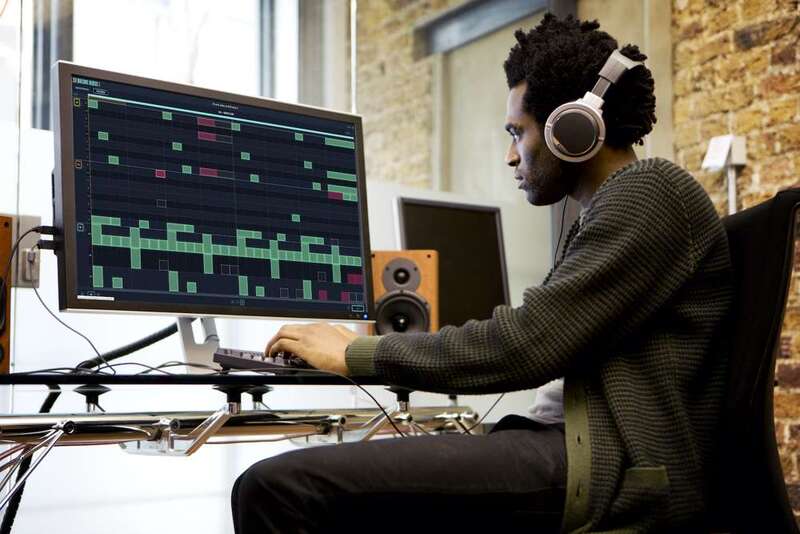
Traditional music theory takes place in the centuries-old music staff and is loaded with information that doesn't always apply to a DAW environment. So Building Blocks takes a streamlined need-to-know approach, removing the music staff and replacing it with the Piano Roll.
Learning music theory in the Piano Roll is crucial for DAW-based musicians. The Piano Roll is a note editing interface found in today's most popular DAWs. So you'll be learning in an environment that you can actually use to create music in your every-day music-making process.
Create Original Music
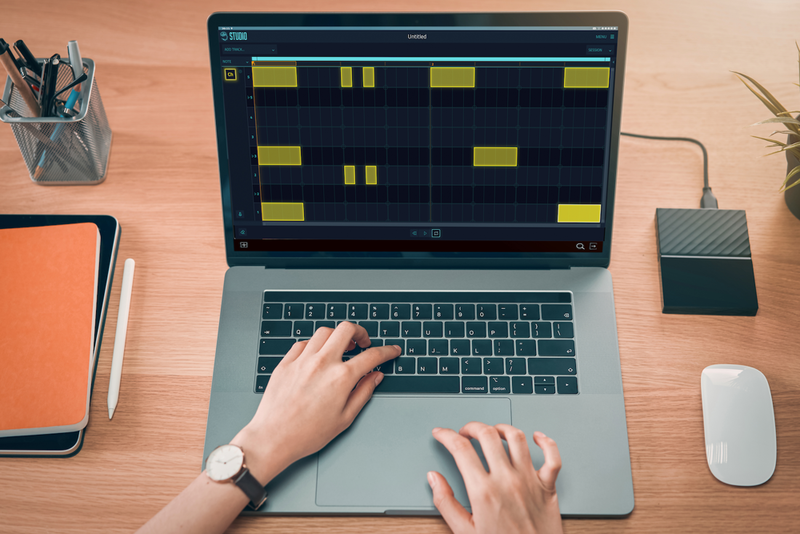
Throughout this online music composition course, you'll be writing your own original music in our online music production studio. Every few lessons, you'll be prompted to take what you've learned and write a drum pattern, bassline, chord progression, or melody. Sometimes you'll be asked to write them together, or create a full beat from scratch.
By the end of Building Blocks, you'll have plenty of original music to jump-start new songs. And our MIDI Export feature will make it easier for you to transfer your music from Building Blocks to your DAW-of-choice.
Interactive Ear Training
Unlike other music production courses, Building Blocks is more than just a series of videos. In almost every lesson, you'll encounter an interactive ear training challenge that takes place in our online music production studio.
You'll recreate hidden drum patterns, basslines, chord progressions, and melodies by ear. Every time you place a note correctly, your ear will get a little bit stronger. And eventually, you'll be able to start creating the music you hear and feel.
Check out this detailed Walkthrough:
A Proven Method

The Building Blocks online music production course is brought to you by Audible Genius, the creators of Syntorial. Syntorial is an award-winning synthesizer training app.
Syntorial has become the go-to method for learning how to design sounds with a synthesizer. With Building Blocks, we've taken the same interactive ear-focused approach and brought it into the world of composition.
What Exactly Will I Learn in Level 1?
Drums
- Using the three core drums of Kick, Snare, and Hi-Hat, to create an endless variety of patterns and rhythmic feels.
- Using Velocity to vary the volume of drum notes to make your drum grooves bounce and come alive.
Bass
- Writing Bass rhythms that feel great with the Drums, an essential relationship that is needed to set up a strong rhythmic foundation for your song.
- Setting up the tonality for the Chords, and writing basslines that support the Chords' harmony.
Chords
- How to use different chord types to influence a song's tonality and mood.
- Voicing block chords to create a variety of top-line movement.
- Arpeggiating chords to excite the overall rhythm with linear movement.
All Tracks
- How to use Phrasing to provide conversational movement and rhythm, enabling your music to connect with the listener.
- How to make the tracks work together to create a cohesive sound and feel.
Music Theory
- Core song elements: Beat, tempo, measures, and more.
- Understanding Relative Pitch and using it to determine a song's tonality and mood.
- Building essential chord types and navigating their related chord tones and non-chord tones.
- Rhythm: Placement, duration, how it relates to the beat, and how it determines a song's groove and feel.
- Tonality: How pitches and the intervals between them influence the mood of a song.
Ear Training
- Develop and train your ear to recognize the elements mentioned above, including pitch and rhythm.
- Gain the ability to start taking what you hear in your head and in the music you listen to, and translate it into your music.
What Exactly Will I Learn in Level 2?
Melody
- Writing an engaging Melody that connects with the listener.
- Infusing expression into a Melody with Legato and Grace Notes.
- Using speech patterns to inspire Melodic phrasing.
- Navigating Melodies over chord changes.
Chords
- Writing chord progressions with changing roots.
- Anticipating chord changes to create a more fluid and flexible movement through your song's harmony.
- Inverting chord voicings to make your chord progression more melodic and engaging, and less clunky.
Bass
- Writing Basslines under chord changes.
- Anticipating root changes.
- Adding life and personality to your bassline with Legato and Grace Notes.
Drums
- Adding additional drums to your patterns like Open Hi-Hat, Toms, Clap, and Sidestick.
- Generating more rhythmic feels with Half-Time and 16th Shuffle.
- Creating drum patterns without one or both backbeats to create a more low-key rhythmic foundation.
Music Theory
- Extending the relative pitch range to a full octave.
- Intentionally overlapping adjacent notes to create Legato connections.
- Adding Grace Notes to create expressive bends at the beginning of a note.
- Staying in Key to create Diatonic chord progressions.
- Following the continually shifting chord tones and non-chord tones through chord changes.
- Moving backbeats to different beat locations and how it affects a song's overall feel.
- Increasing the number of beat divisions to generate a shuffled and/or triplet rhythmic feel.
Ear Training
- Develop and train your ear to recognize the elements mentioned above, including pitch, rhythm, and chord changes.
- Further refine the ability to start taking what you hear in your head and in the music you listen to, and translate it into your music.
System Requirements
- Mac or Windows computer
- The latest version of Chrome, Opera or Edge or any other chromium-based browser. (More devices and browsers coming soon)
Important Note: Building Blocks 1 is used as the example
1. Go to www.audiblegenius.com/redemption
2. Enter the redemption code found in the courses section of your Plugin Boutique User Account > Click 'Submit'.
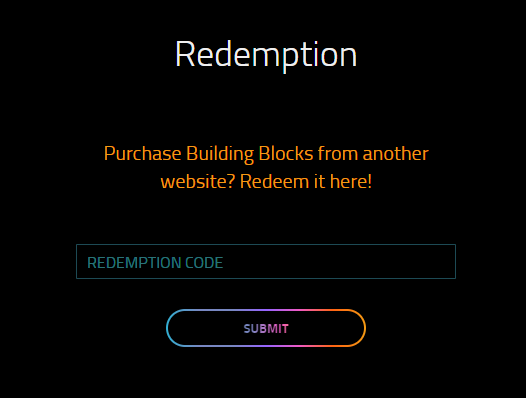
3. Enter your email > Click 'Submit'.
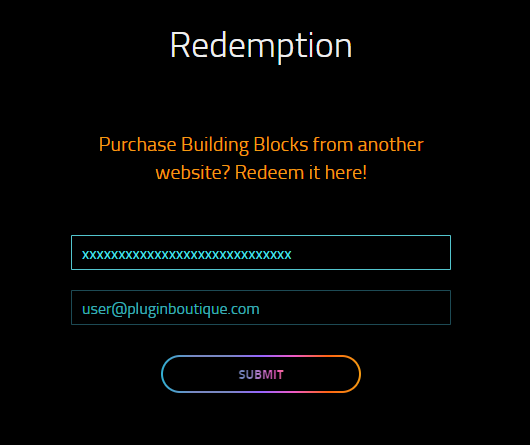
4. Enter your name and create a password > Check the box to agree to the Terms of Use and Privacy Policy then click 'Submit'.
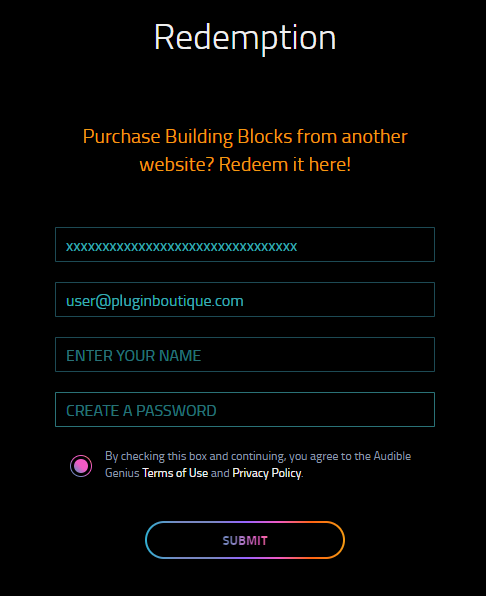
5. Click the name of the course to begin.
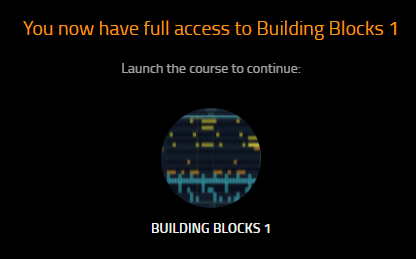
Your course has now been redeemed!

